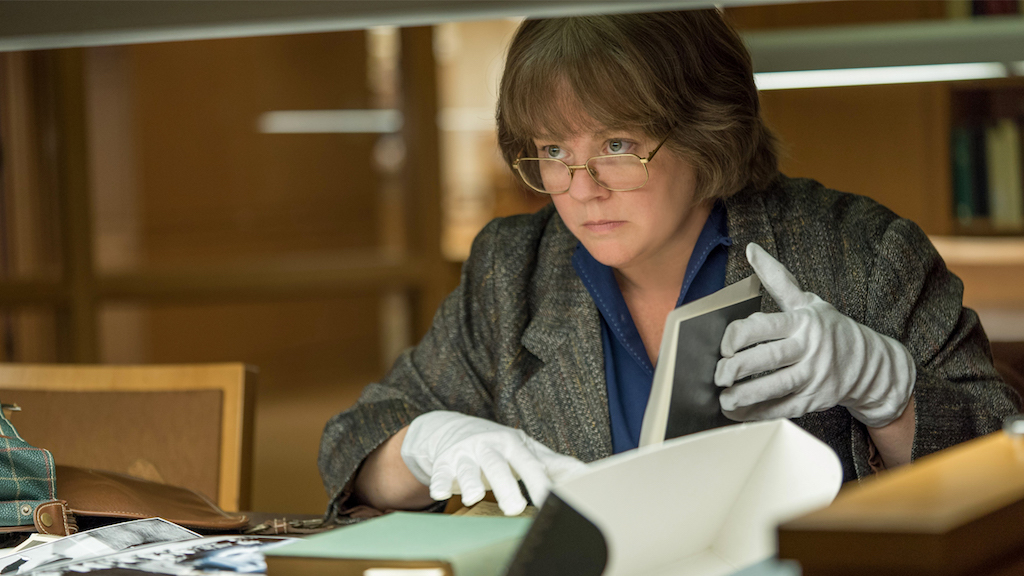
Watching Can You Ever Forgive Me?, I was suddenly reminded of one of my favorite films, Tootsie. If you recall, in that film Dustin Hoffman played a talented actor who was so arrogant, so socially toxic, so filled with entitlement, he couldn’t get work. A similar fate has befallen Lee Israel (Melissa McCarthy), the prickly and anti-social heroine of Can You Forgive Me?, which is based on a true story. A talented writer, she’s had a few successful books, but her form of rigorous biography has gone out of fashion, replaced by novels and memoirs from celebrity authors. (The film is set in 1991: Tom Clancy and Nora Ephron are both name-checked as successful writers of the day.) What’s more, with her frumpy personal style, caustic sense of humor, and indifference to social niceties, she’s simply unpleasant to be around. Oh, and did I mention she’s a drunk? Israel’s agent (Jane Curtin) wants to be done with her, but tries to give her some advice, a la Sydney Pollack in Tootsie: Get sober and be nicer. To Israel, this is a nearly impossible request.
Israel regularly drowns her sorrows at a neighborhood watering hole, which is where she meets the similarly dissolute Jack Hock (Richard E. Grant), a bon vivant, who has managed to get by on good looks, gameness, and charm, but who is definitely aging out of his lifestyle. They become fast friends and drinking buddies.
Meanwhile, while researching her latest book, a biography of Fanny Brice, Israel stumbles across an old letter of Brice’s, which she is able to sell for cash. The buyer notes that letters that show off a famous writer’s talent and wit are extremely rare and therefore most desirable, which gives Israel notions. She buys a bunch of old typewriters, learns to age paper in her oven, and starts forging fake letters from famous writers—Dorothy Parker, Noel Coward, Lillian Hellman—always managing to emulate their trademark style and voice. (The irony is that we consumers want our favorite writers to have a consistent public and private persona—Israel is able to provide that false, if comforting, narrative.) She starts making a lot of money—she and Jack Hock begin to do a bit of galavanting around town—and we nervously wait for her to get caught.
As Israel, McCarthy sheds all her (admittedly surefire) comic instincts and gives a remarkably understated performance. It would be so easy to overdo it, making Israel a pathetic cat lady or wisecracking drunk in a sitcom vein. Instead, she conveys everything—Israel’s gimlet-eyed observations, her depression, her alcoholism, her tendency toward self-sabotage—with enormous subtlety. Even more so, she makes it clear that Israel has an ego investment in these letters—she’s proud of her ability to mimic these great minds, but frustrated that she gets no public approbation for her work. (Jack, the only one who knows about her illegal vocation, is useless on that front.) That paradox—she was a misanthropist who craved public approval—gets to the heart of her character (and the heart of many writers, in general).
As Jack, Richard Grant is her equal, embodying this aging party boy so fully, it’s as though he were born to play the part (in some ways, he was; it was his irresistible performance as a flamboyant drunk in Withnail and I that launched his acting career 30 years ago). Jack always provides an injection of devilish mischief and fun into the film—and Israel’s life—but we see the sadness and regret around his edges, too. It’s beautiful work.
Can You Ever Forgive Me? has a literary, insightful, and witty script by Nicole Holefcener and Jeff Whitty and is directed with a pitch-perfect tone and an evocative sense of place by Marielle Heller (The Diary of a Teenage Girl). It’s an actual film by grownups and for grownups. Is this real life?
